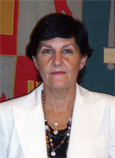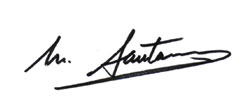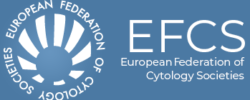| Letter from the President of the XXXIII EFCS Congress, Madrid. 20 December 2007 |
 |
The 33rd European Congress of Cytology Societies took place in Madrid, Spain between 14 and 17 October 2007. Our offer to host the congress had been a spontaneous idea in Prague back in 2003, and we never really dreamt that our proposal, put forward for consideration to the EFCS meeting, would be accepted. We suddenly found ourselves confronted with the tremendous challenge of organizing a congress to accommodate the highest scientific standards found in Europe. These were the ideas which crossed my mind as the congress finally became reality with the concise announcement of Luigi Di Bonito in the Opening Ceremony, “The congress is open.”
Report
Over 500 delegates, 68 guests and 20 students, from 47 countries and all continents, attended the four days of the congress. We had prepared a very complete program distributed between the auditorium and three other large meeting rooms in the Hotel Meliá Castilla. The eight workshops were well-received, with 124 participants. Posters, which were exhibited throughout the congress in Sala Hidalgo, numbered 204. Several interesting commercial presentations were also welcomed by the congress.
There were 44 sessions to cover all areas of cytology, including new techniques in gynecological and non-gynecological cytology at the cutting edge of molecular biology and new strategies in HPV vaccination at the forefront of epidemiological study. I personally found R.H. Bardales’ sessions on the gastrointestinal tract and endoscopy particularly useful. The congress was further enriched by two sessions specifically managed by and designed for cytotechnicians. In addition, a virtual seminar took place, which provided a dynamic perspective on cytological smears.
In the 64 oral presentations, participants kindly shared their valuable experience on all aspects of our field. Presentations were organized into sessions which were held in different rooms concurrently. On Monday, the main room, the Auditorium, was dedicated exclusively to presentations and debate related to gynecological cytology. On Tuesday morning, the focus was on breast cytology. I would like to mention three especially memorable conferences: The Role of Cytology on the Future Research on Cancer by D. Beccati and M. Jiménez-Ayala; Follicular Neoplasms of the Thyroid, presented by P. Vielh; and Techniques of the Future by E. de Alava.
Under the umbrella of the congress, the Papanicolaou Society of Cytopathology and the International Academy of Cytology organized two meetings: The Future of Cytology in Developing Countries, and Challenges in Breast Pathology in the Era of Globalization. Other events included meetings of QUATE, EFCS, EACC, and a Cytopathology Advisory board meeting. Also hosted was a symposium shared by the Association of Cervical Pathology and Colposcopy (APCC) and the Spanish Society of Cytology.
I would like to remind those who were present of some of the events which took place. After the opening ceremony we enjoyed a concert by Dorota Grezskowiak as soprano and Itziar Barredo as pianist. On Monday evening the Madrid Medical College invited us all to a delightful performance by their chorus, in the magnificent Ramón y Cajal hall. Tuesday evening was reserved for the congress dinner, which was followed by dance music. The final evening found us visiting the Cecilio RodriguezGardens for a formal closing ceremony at the invitation of the Madrid Town Hall; we enjoyed the warmth of the last rays of sunlight creating a spectacular sunset through the trees and reflecting on the statues and fountains of these fantastic gardens.
Proposals
Before closing this letter, let me make the most of this opportunity to outline three proposals relating to organisational aspects of European cytology under the EFCS.
The first of these proposals, which stems directly from our experience of organizing the congress, is that the EFCS should build up and maintain a database of experts who are disposed to participate in future EFCS congresses. This would facilitate enormously the process of organizing future congresses by enabling the local scientific committee to get into direct contact with potential delegates from different countries.
Second, we propose that the web page of the EFCS be used as a forum within which to develop cooperation on specific new research between individual cytologists or laboratories in different countries.
Finally, it would be a useful role for the EFCS to coordinate the exchange of cytologists between laboratories or institutions in order to improve continuing education. A step in this direction might be for the EFCS to use its web-site to inform prospective ‘students’ of offers to host foreign cytologists.
I would be very grateful if anybody who feels strongly about these issues would get in contact with me so that we can start mobilizing forces and organizing practicalities. Similarly, any offers of support or help with the necessary work will be much appreciated. So, these are three areas to discuss over the following few months.
On behalf of the Spanish Society of Cytologists and the scientific committee I thank PhilippeVielh, Luigi di Bonito, and Martin Tötsch for their guidance and support and to José María Rivera and Domingo de Agustín for their invaluable help in preparing the congress. Of course, our deepest gratitude must go to everybody, (chairmen, co-chairmen, speakers and participants) who participated in this event, the 33rd edition of the European Congress of Cytology, and made it so worthwhile.

Mercedes Santamaría
President of the XXXIII EFCS Congress
Madrid 2007
